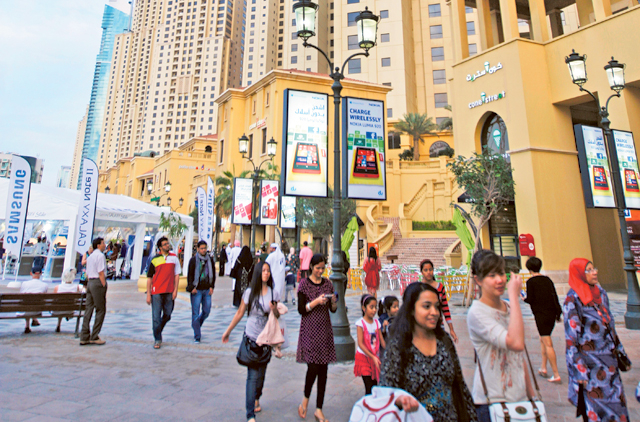Dubai: An overwhelming majority of Dubai residents said they feel happy, safe and proud that they live in Dubai, a new survey revealed.
Others said there are still areas of improvement such as services for people with disabilities, volunteering and a few financial concerns,
Dubai residents are happier now compared to how they were doing in 2011 and 2013, according to the fourth Dubai Social Survey 2015 released by the Community Development Authority (CDA) on Monday.
The residents rated their degree of happiness at an average of 8.2 on a scale of 0 to 10, with 10 being “extremely happy”, which increased from the 7.9 rating in 2011 and 8.0 in 2013.
The elderly proved to be the happiest bunch among those surveyed, followed by youth aged between 18 and 29. The pointer dropped a little at the segment of those aged 30 to 58. In terms of nationality, Arabs gave the lowest rating of 7.4 while Asians and Africans gave the highest rating of 8.4.
“The Dubai Social Survey revealed positive results. We saw a positive trend from 2011 to 2013 to 2015, which means the services and Dubai are on the right track. The level of happiness has also increased from 2011 to 2013 and also from 2013 to 2015,” Ahmad Julfar, CDA director-general, told Gulf News.
Julfar said the survey aims to measure the current levels of the key performance indicators of the Dubai Strategic Plan to measure the feeling of happiness among community groups, feeling of safety and security, level of satisfaction with services offered, and identification of social issues of concern to the community.
The Dubai Statistics Centre conducted field surveys and visited 3,276 households, including labour accommodations, to come up with “transparent and comprehensive” results from a total study sample of 15,165 people.

When asked if this sample is enough to accurately represent the perceptions of the 2.7 million people residing in Dubai, officials emphasised that the sample is actually higher than samples used in surveys conducted in other countries and even higher than the previous three surveys they had conducted. The respondents were also surveyed randomly in 110 areas in the different clusters in Dubai from September to November 2015 to get the best results.
To measure the level of happiness, for example, Julfar said the researchers used two indices: a straightforward question on how happy they are for the past 24 hours and the other a set of questions about their income, their feeling of safety, and their perception on the services in Dubai.
Respondents also perceived their safety and security increased a bit from 92.8 per cent in 2011 to 98.3 per cent in 2015. Some 98 per cent of the respondents said they feel safe and secure when walking alone at night in the neighbourhood, which is higher than the perceptions in Hong Kong, Singapore and Norway based on the Law and Order report for 2015 issued by Gallup.
Another 97 per cent of the respondents said they feel proud to be living in Dubai and 98 per cent said they trust police performance.
Financial issues
Respondents’ confidence in their family income meeting their needs dropped significantly from 2013 to 2015. Some 58.5 per cent of Emiratis said their income is enough to meet their needs in 2015, down from 70.1 per cent in 2013. Among non-Emiratis, 71.2 per cent said their income is sufficient, a drop from 86 per cent in 2013.
In terms of borrowing, a gradual decrease in getting loans was seen from 2011 to 2015. Despite this, two in 10 Emiratis or, in total, one in 10 respondents still missed payment in at least one of their loan instalments in 2015.
Julfar said since this concern is not under the services handled by CDA, his team will communicate the survey results with relevant authorities to address the matter.
Areas of improvement
Satisfaction levels in the different services in Dubai such as services for senior citizens, human rights, educational, health, and financial aid are beyond the 90 per cent mark.
Respondents, however, gave a relatively low rating for services for people with disabilities and their families at 71.6 per cent.
Volunteering also remained at a low rate of 9.2 per cent among Emiratis and 3.6 per cent among non-Emiratis.
Hana Bakkar Al Harthi, director of Social Cohesion Department at CDA, said that this number reflects only the perception or the level of awareness of people on volunteering.
“We have had tremendous impact from the Volunteer App we created last year but this impact is not going to be reflected on the survey this year. It will come only next year. But it is still a positive impact for the whole community,” Al Harthi told Gulf News.









